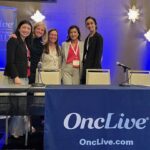A recent study published by Dr. Dipti Patel-Donnelly, of Virginia Cancer Specialists and colleagues has shed light on a groundbreaking approach in the treatment of advanced-stage classical Hodgkin lymphoma (cHL) in older patients. This noncomparative phase 2 study, detailed in the research article here, explores the efficacy of brentuximab vedotin (BV) in combination with dacarbazine (DTIC) or nivolumab as frontline therapy for patients aged 60 and above who are unfit for conventional chemotherapy.
The study enrolled a cohort of older patients, many with significant comorbidities or frailty, for whom conventional chemotherapy might not be suitable. In one arm of the study, patients received BV with DTIC, while another group was treated with BV combined with nivolumab.
Results from the study showcase remarkable outcomes. Among the patients treated with BV-DTIC, an impressive 95% achieved an objective response, with 64% achieving a complete response (CR). The median duration of response (mDOR) was 46.0 months, with a median progression-free survival (mPFS) of 47.2 months and a median overall survival (mOS) that was not reached within the follow-up period.
Similarly, in the group receiving BV-nivolumab, 86% of patients attained an objective response, with 67% achieving CR. The follow-up period of 51.6 months revealed that mDOR, mPFS, and mOS were not reached.
Adverse events were observed in both treatment arms, with sensory peripheral neuropathy and neutropenia being most common in the BV-DTIC group, while lipase increase and different forms of peripheral neuropathy were predominant in the BV-nivolumab group.
One of the most striking aspects of this study is the demonstration of safety and promising durable efficacy of these BV-based combinations as frontline treatments, even in older patients with significant frailty and advanced age, with individuals up to 88 years old included in the trial.
These findings offer a beacon of hope for older patients with cHL who are ineligible for initial conventional chemotherapy. The study suggests that BV-based therapies could serve as viable alternatives, providing both safety and efficacy in this patient population.
For more detailed information, the full study can be here on ClinicalTrials.gov.
This study opens doors to new possibilities in Hodgkin lymphoma treatment, emphasizing the importance of tailored therapies for different patient demographics and highlighting the potential of innovative drug combinations in improving outcomes for those previously considered ineligible for standard treatments.
Please note that the article and its findings are copyrighted by the American Society of Hematology.







